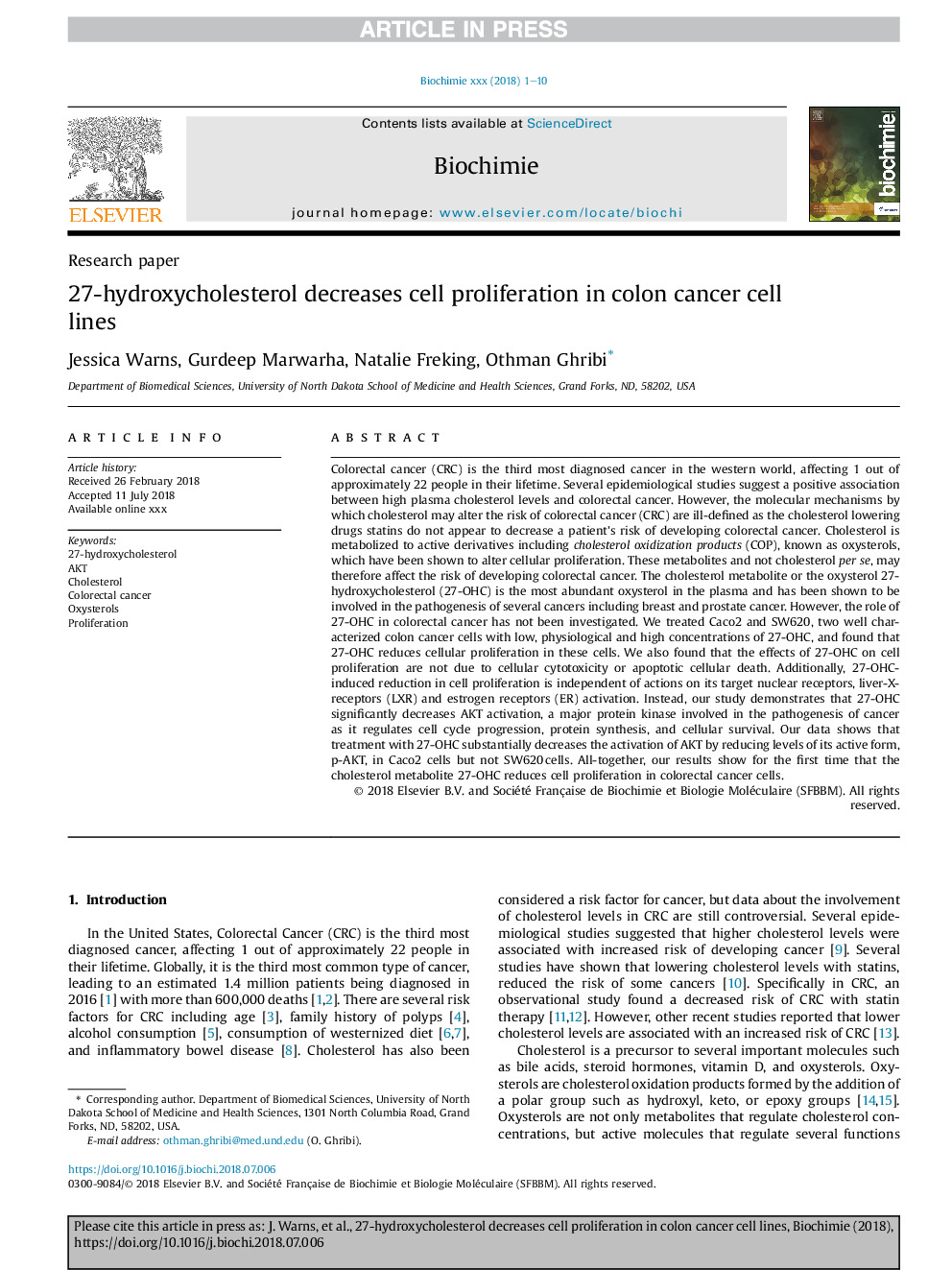| کد مقاله | کد نشریه | سال انتشار | مقاله انگلیسی | نسخه تمام متن |
|---|---|---|---|---|
| 10156771 | 1666426 | 2018 | 10 صفحه PDF | دانلود رایگان |
عنوان انگلیسی مقاله ISI
27-hydroxycholesterol decreases cell proliferation in colon cancer cell lines
ترجمه فارسی عنوان
27 هیدروکسی کلسترول باعث کاهش تکثیر سلولی در سلول های سرطانی کولون می شود
دانلود مقاله + سفارش ترجمه
دانلود مقاله ISI انگلیسی
رایگان برای ایرانیان
کلمات کلیدی
موضوعات مرتبط
علوم زیستی و بیوفناوری
بیوشیمی، ژنتیک و زیست شناسی مولکولی
زیست شیمی
چکیده انگلیسی
Colorectal cancer (CRC) is the third most diagnosed cancer in the western world, affecting 1 out of approximately 22 people in their lifetime. Several epidemiological studies suggest a positive association between high plasma cholesterol levels and colorectal cancer. However, the molecular mechanisms by which cholesterol may alter the risk of colorectal cancer (CRC) are ill-defined as the cholesterol lowering drugs statins do not appear to decrease a patient's risk of developing colorectal cancer. Cholesterol is metabolized to active derivatives including cholesterol oxidization products (COP), known as oxysterols, which have been shown to alter cellular proliferation. These metabolites and not cholesterol per se, may therefore affect the risk of developing colorectal cancer. The cholesterol metabolite or the oxysterol 27-hydroxycholesterol (27-OHC) is the most abundant oxysterol in the plasma and has been shown to be involved in the pathogenesis of several cancers including breast and prostate cancer. However, the role of 27-OHC in colorectal cancer has not been investigated. We treated Caco2 and SW620, two well characterized colon cancer cells with low, physiological and high concentrations of 27-OHC, and found that 27-OHC reduces cellular proliferation in these cells. We also found that the effects of 27-OHC on cell proliferation are not due to cellular cytotoxicity or apoptotic cellular death. Additionally, 27-OHC-induced reduction in cell proliferation is independent of actions on its target nuclear receptors, liver-X-receptors (LXR) and estrogen receptors (ER) activation. Instead, our study demonstrates that 27-OHC significantly decreases AKT activation, a major protein kinase involved in the pathogenesis of cancer as it regulates cell cycle progression, protein synthesis, and cellular survival. Our data shows that treatment with 27-OHC substantially decreases the activation of AKT by reducing levels of its active form, p-AKT, in Caco2 cells but not SW620â¯cells. All-together, our results show for the first time that the cholesterol metabolite 27-OHC reduces cell proliferation in colorectal cancer cells.
ناشر
Database: Elsevier - ScienceDirect (ساینس دایرکت)
Journal: Biochimie - Volume 153, October 2018, Pages 171-180
Journal: Biochimie - Volume 153, October 2018, Pages 171-180
نویسندگان
Jessica Warns, Gurdeep Marwarha, Natalie Freking, Othman Ghribi,
